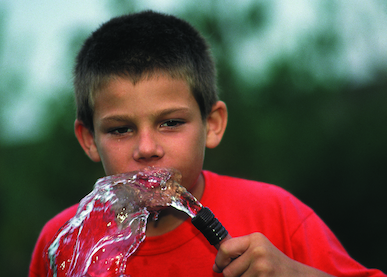
Last week I received an invitation from the White House to attend the launch of the National Climate Assessment on May 6th. After checking my busy schedule to see if there were any pressing conflicts (there were oddly none), and getting Secret Service clearance (I passed—phew!), I now find myself at once giddy, nervous, and honored to be able to participate in the official launch of the third National Climate Assessment (NCA).
You may be wondering: "What is NCA and why should I care? Is this just another gloomy report about climate change?"
Officially, the NCA is one of the projects under the charge of the US Global Change Research Program, authorized by the Global Change Research Act of 1990, which requires these reports to inform the President and Congress about climate impacts on the nation every four years. Over the past 24 years, though, there have been exactly two before this one, one in 2000, the second in 2009. So not exactly the greatest follow-through from our government on one of the greatest challenges to face the planet.
But the current administration has stepped up in a big way. This NCA is a potential game-changer in terms of informing, preparing, and protecting the nation and arguably the world's most precious human resource: young people.
To describe youth as "our most precious resource" can be dismissed as trite cliché. But currently in the USA—the third most populous nation in the world—one in four people are students. Millions more are parents, grandparents, current or future employers. But, as the Six Americas research on Knowledge of Climate Change have shown, most teens and adults fail basic climate and energy literacy, having never learned the essentials in school.
The good news is that the current report is not only packed with information, maps, images, stories and case studies about already observed changes, and anticipated trends for the future, but also data sources.
What does this mean for educators and students? Boatloads of opportunities to drill down into the data to learn more about how climate change is impacting our country.
What does the report cover? Well, just about everything.
Want to know how climate change is impacting your region? They have that. How climate change will affect coastal and marine systems? That’s included. Did they include tribal nations? Of course. How human health, agriculture and water resources will change? That, too. Energy supply and use? Yep. Biodiversity? Sure. All this and much, much more. A veritable treasure trove of information.
And most of all: you'll be able to access the report in all its glory from your computer, smartphone, or iPad as you are on the road, relaxing by the pool or snuggling into bed at the end of the night. Instead of compulsively checking your mobile device for Facebook updates or email, you can be learning on the fly, bolstering your understanding of the changing climate and what to do about it.
This—the ability to foster mobile learning—is arguably one of the most important aspects of third assessment.
As Darrell West notes in a Brookings Institute report "Mobile Learning: Transforming Education, Engaging Students, and Improving Outcomes"
American education was designed for agrarian and industrial eras, and does not provide all the skills needed for a 21st century economy. This creates major problems for young people about to enter the laborforce. Mobile learning represents a way to address a number of our educational problems. Devices such as smart phones and tablets enable innovation and help students, teachers, and parents gain access to digital content and personalized assessment vital for a post-industrial world.
And it’s precisely the accessibility and interactivity of the report that may be a real game-changer for educators.
It's not hard to imagine engaging, interdisciplinary curriculum using the report to integrate the sciences, mathematics, history, civics, social studies, weaving in other arts and humanities. Or students developing their own videos, posters, games…maybe even interpretive dance or rap songs…using information gleaned from the NCA portal to demonstrate their mastery of 21st-century science that has been vetted by experts.
The NCA is the first step to changing the conversation in America about climate change, and educators have a unique opportunity to jump in and use this new material to bring the challenges of climate change home to their students.
Interested in following the NCA roll-out?
We'll be reporting from the NCA Data Advisory Committee meeting on the morning of May 6th, CLEAN will have a special call Tuesday at 1PM ET to discuss the educational opportunities of the report, the event at the White House—which will be webcast—launching NCA will occur between 2 to 4 PM ET, and we will have a conference call from the White House with some of the movers and shakers behind the report to discuss the educational opportunities at 5PM ET. Stay tuned for more details.
Want to get more involved with the NCA roll-out and bringing it into the classroom? Get in touch with us at NCSE to be added to the NCA education affiliate group, where we are working to develop value-added resources for educators to bring the NCA home for their students.
